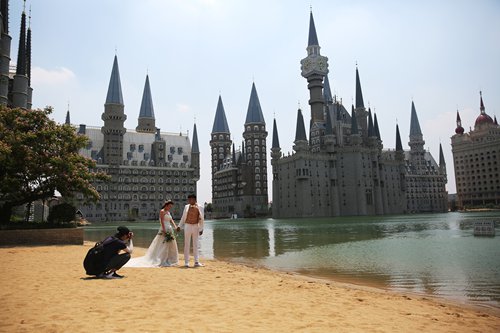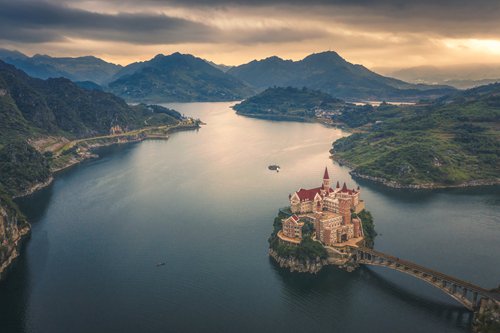
From the People's Daily app.
And this is Story in the Story.
The stunning castle towers come into view when driving on national road No. 107, about 20 minutes from Shijiazhuang's Zhengding Airport. The Gothic-style castle has dozens of gray spires that stretch into the smoggy sky of Hebei Province in North China, and is part of the Hebei Academy of Fine Arts campus.
The castle became an internet phenomenon after a Hebei vlogger, Schlieffen, visited the campus and published a video on Sina Weibo in May. In the video, titled "Hogwarts Hebei branch," Schlieffen showed the collection of items on campus, such as printed masterpieces in a basement and a pirate boat in the canteen.
The video, only three minutes long, had received more than 8.8 million views with 11,000 comments on Weibo as of press time.Castles are not common in China. However, in recent decades, modern takes on the medieval structures have popped up around China, some of them rivaling the originals in Europe in luxury and grandeur.
Unlike in medieval Europe, ancient China banned local chiefs from building castles because of centralism. But in current consumer society, castles are no longer a symbol of war and fortresses anymore, they stand for a "noble" spirit and lifestyle, and some hotels, schools and scenic spots have adopted this symbolism and built castle-like buildings.
Today’s story in the story looks at how the castle building becomes a phenomenon in China and how it is related to the anxiety of China's newly rich about identity and class stratification.

A couple takes wedding photos in front of the "Harry Potter" castle at Hebei Academy of Fine Art in North China's Hebei Province. (Photo: VCG)
Wang Yan has fulfilled her dream of getting married in a castle at the age of 22.
"It's so beautiful here. The scenery is so nice," Wang said in a white wedding dress, posing in front of the castle, like a real princess.
The castle, named Cinderella Castle, is part of the Hebei Academy of Fine Arts campus, and contains a set of buildings, each in different styles, colors and materials.
Entering a multi-functional building: a management office occupied the third floor, the second floor had restaurants, one serving Korean bibimbap, and students rushed into the basement, where some classrooms were located. One of the castles serves as a hotel, which is run by a hotel company operating out of the school. The price of a night's stay is around 100 yuan ($14.50).
The structures also hold student dormitories, but there were complaints that the school banned students from hanging their clothes to dry outside because it would ruin the architecture's aristocratic effect.
The castle's interior lives up to its outward majesty. Colorful Baroque-style painted plafonds depict European legends, life-size sculptures stand by the wall, and hundreds of printed masterpieces fill the corridors.
Apart from the castle, the campus also features traditional Chinese buildings and replicas of other world landmarks, such as pagodas, the Confucius temple, the Statue of Liberty and London's Tower Bridge.
Liu Yunhao, assistant director of the management committee of the campus region said that the campus was built starting around 2009.
"The old headmaster of the school told us, 'You build a castle there. The castle will bring a lot of resources to our students,'" Liu said. "The art students could learn something about Western art history. They could also do sketches on campus."
Zhen Zhongyi, headmaster and a local businessman, built his fortune through art education in the 1990s before building the academy.
"The buildings here have borrowed some things from the famous architecture of China and overseas," Liu said. "But it is just a style. We have made our own changes based on the style. We do not copy."
Liu said that it would take 27 years to finish building the whole campus. The project has won support from the government. "But the financial support is not much for us, as our investment has been too big." He said that 2 billion yuan has been put into the project and estimated it would take 3 billion more to finish.
Liu said enrollments are increasing year by year.
"I saw the advertisements for the school and thought the castle was so beautiful," Wang Delin, a media student at Hebei Academy of Fine Arts, said when asked why he chose to attend.
Jilong Castle Country Club, a four-star hotel located in the center of a remote lake in Southwest China's Guizhou Province, looks very much like the famous Bavarian Neuschwanstein Castle, which served as inspiration for Disney.
Staying one night at the castle costs only 262 yuan.

Jilong Castle Country Club, a four-star hotel, sits in the center of a remote lake in Southwest China's Guizhou Province. (Photo: VCG)
However, not all fairytales can come true for such a low price. At the Castle Hotel in Dalian, a coastal city in Northeast China's Liaoning Province, rooms go for at least 1,248 yuan per night.
The luxury hotel, which stands on a mountain in the city center, has become one of the most eye-catching landmarks in Dalian.
The Wencheng Castle in Penglai in East China's Shandong Province became famous this year after being featured in the Chinese comedy Hello Mr. Billionaire.
Built in 2011 by architect Li Wencheng, the castle is a chateau in the Baroque style. Now it has become a scenic spot charging 60 yuan per entrance ticket.
Castles were typical fortified buildings of medieval Europe. Since reform and opening-up, Chinese people have become acquainted with castle-style buildings as communication between China and the West has increased, Jiang Haisheng, head of the Journalism and Communication Department at Shandong University of Political Science and Law said.
For many Chinese people, castles are exotic and attractive, so they have been built to draw tourists. "It is not necessary to say China lacks confidence in culture when seeing castles," Jiang noted.
While building new castles in China, China's rich are also buying them up abroad. Cheng Haiyan, a wine company owner from Qingdao, Shandong, bought Latour Laguens, an ancient Bordeaux chateau, to upgrade her business. Zhang Yin, currently China's richest woman, has also bought a castle in the region, the report quoted an insider as saying.
Whether they choose Western- or Chinese-style nobility, it shows that the newly wealthy long to package themselves as a more traditional upper class, said Shi Wenxue, a Beijing-based cultural critic.
This psychology indicates some people's feelings of inferiority, vanity and anxiety about the identity of the newly rich, he said.
But if the castles do not fit the environment, government departments might need to manage them and their construction, Jiang said, adding that this is the same when building traditional Chinese buildings. "Everyone rushing to build a certain style of building, like chasing a trend, is not proper."
China is promoting traditional culture, and building castles should not be encouraged, as many of them look odd - neither Chinese nor truly Western. "Regardless of artistry, style or design, the most important thing for a building is for it to be practical and suit the environment around it," said Shi.
(Produced by Nancy Yan Xu, Da Hang, Lance Crayon, and Brian Lowe. Music by: bensound.com. Text from Global Times)


